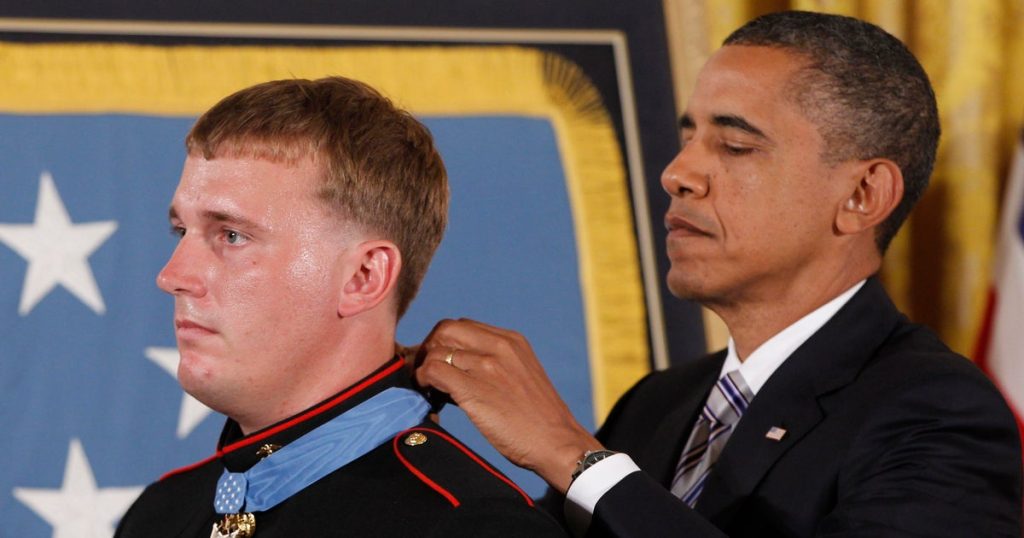Former Marine and Medal of Honor recipient, Dakota Meyer, has announced his return to military service, reenlisting in the Marine Reserves after a 15-year hiatus. Best known for his exceptional bravery during the Afghanistan War, Meyer has been a vocal critic of the Biden administration’s approach to the chaotic withdrawal from Afghanistan. During a recent briefing, he expressed his motivation to serve again, emphasizing that he has “more to give” while stating he would remain politically neutral while in uniform.
| Article Subheadings |
|---|
| 1) Reenlistment Motivations and Statements |
| 2) The Heroic Actions of Dakota Meyer |
| 3) Challenges Faced Post-Military |
| 4) Meyer’s Ongoing Advocacy |
| 5) The Legacy of Valor |
Reenlistment Motivations and Statements
On Thursday, in a briefing with reporters, Dakota Meyer, now 36, shared the reasons behind his decision to reenlist in the Marine Reserves. He emphasized that after spending 15 years out of military service, he felt compelled to serve once again, declaring he “had more to give.” His passion for service continues to burn brightly, and he has declared political neutrality while in uniform. He stated, “The great part about being in the reserves is I’m still a citizen when I’m not on orders,” highlighting the dual role he resonates with. This transition to service represents a significant personal and professional decision for Meyer, who has previously been critical of government policies regarding military engagements.
The Heroic Actions of Dakota Meyer
Meyer earned his Medal of Honor from then-President Barack Obama in 2011 for his extraordinary bravery during a violent ambush in Afghanistan. On September 8, 2009, while serving in the Ganjgal Valley, Meyer was part of a security team supporting a patrol. This routine operation turned dire when approximately 50 Taliban insurgents launched a surprise ambush. The action was characterized by intense gunfire, and Meyer displayed remarkable courage, charging into danger to rescue fellow Marines under fire. Over the course of a harrowing six-hour engagement, Meyer and his team faced overwhelming odds. His decisive actions saved 36 lives and resulted in the elimination of at least eight Taliban fighters. His behavior that day exemplifies the commitment to duty that embodies the military ethos.
Challenges Faced Post-Military
After leaving active duty, Dakota Meyer navigated various personal challenges, including his struggles with post-traumatic stress disorder (PTSD). In a 2019 interview, he discussed his experiences with a new treatment for PTSD, shedding light on the difficulties many veterans face upon returning to civilian life. His marriage to Bristol Palin, daughter of former Vice Presidential candidate Sara Palin, and the subsequent birth of their two children played a significant role in his transition. Despite maintaining a public profile, the psychological toll of his military experiences stands as a constant reminder of the sacrifices made in service.
Meyer’s Ongoing Advocacy
Meyer has been vocally supportive of military personnel and advocates for transparent conversations about the demands of service and the burdens of leadership. His criticism of the Biden administration, particularly regarding the disastrous withdrawal from Afghanistan in 2021, has garnered attention. He notably called for accountability when another Marine, Lt. Col. Stuart Scheller, faced punishment for publicly expressing dissent regarding military strategies. Meyer’s steadfastness in advocating for this Marine illustrates his commitment to supporting his fellow service members, even amid complex political landscapes.
The Legacy of Valor
The recognition Meyer received through the Medal of Honor serves not just as a personal accolade but as a representation of collective military valor. His actions in Afghanistan have inspired countless individuals not only in the armed forces but also within civilian communities. As Meyer resumes his commitment to serve in the Marine Reserves, he carries with him the honor of his past while looking forward to opportunities to impact the future positively. His journey embodies a narrative of resilience, dedication to service, and an unwavering spirit to contribute—both as a Marine and a citizen.
| No. | Key Points |
|---|---|
| 1 | Dakota Meyer, a Medal of Honor recipient, has reenlisted in the Marine Reserves after 15 years out of service. |
| 2 | He cited feelings of having “more to give” and expressed a desire to remain politically neutral while in uniform. |
| 3 | Meyer was awarded the Medal of Honor for his heroic actions during a Taliban ambush in Afghanistan in 2009. |
| 4 | Post-military life has included challenges such as PTSD, and he has become an advocate for veterans’ issues and support. |
| 5 | Meyer has been outspoken about the political implications of military conduct, particularly regarding recent military decisions. |
Summary
The return of Dakota Meyer to military service reflects not only a personal commitment to serve but also a profound statement on the value of ongoing dedication, even beyond the battlefield. His continued advocacy for fellow service members and his willingness to critique military strategies underline the importance of transparency and accountability in military affairs. Meyer’s rich legacy—marked by acts of extraordinary bravery—now expands to include his future contributions as a Marine Reservist and as a community leader.
Frequently Asked Questions
Question: Who is Dakota Meyer?
Dakota Meyer is a United States Marine Corps veteran and recipient of the Medal of Honor for his heroic actions during a firefight in Afghanistan in 2009.
Question: What prompted Meyer to reenlist in the military?
Meyer decided to reenlist because he felt he had more to contribute to the military and service community after being out for 15 years.
Question: How did Meyer become a public figure after service?
Since leaving the military, Meyer has maintained a public presence, sharing his experiences, advocating for veterans, and speaking against government policies affecting military personnel.


